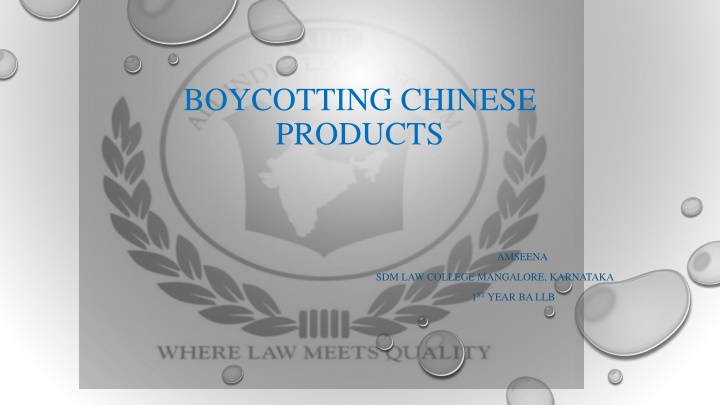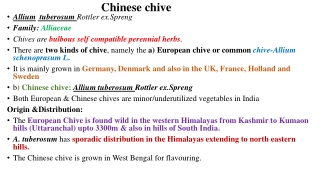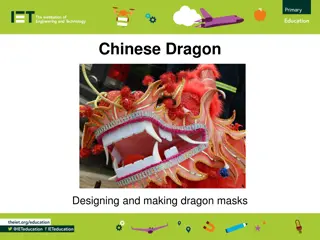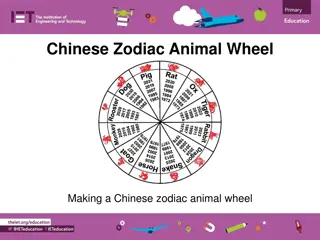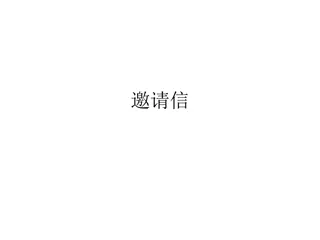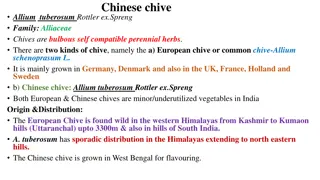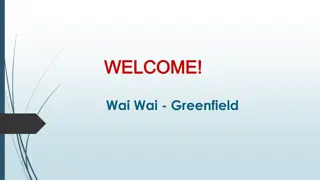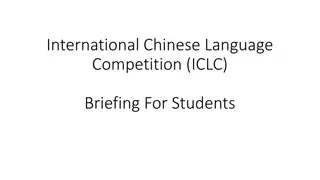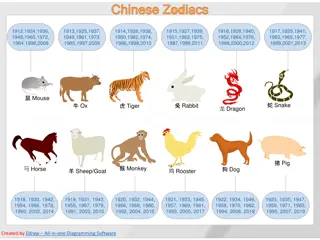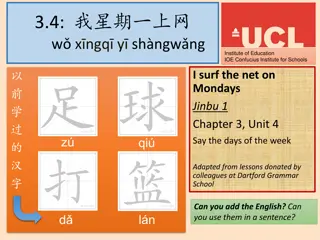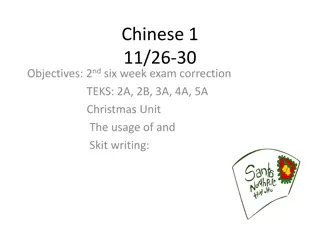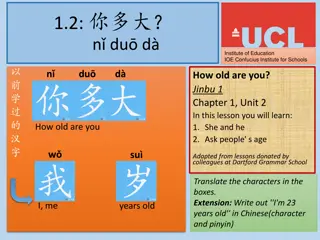BOYCOTTING CHINESE PRODUCTS
Boycotting Chinese products has gained momentum due to concerns over product quality, human rights issues, and territorial conflicts. This action has been advocated by various countries and movements, but achieving a full boycott is challenging due to China's significant global manufacturing presence. Learn about the reasons behind boycotting, such as the 2008 Chinese milk scandal, technology scrutiny, and the current COVID-19 pandemic narrative.
Download Presentation

Please find below an Image/Link to download the presentation.
The content on the website is provided AS IS for your information and personal use only. It may not be sold, licensed, or shared on other websites without obtaining consent from the author.If you encounter any issues during the download, it is possible that the publisher has removed the file from their server.
You are allowed to download the files provided on this website for personal or commercial use, subject to the condition that they are used lawfully. All files are the property of their respective owners.
The content on the website is provided AS IS for your information and personal use only. It may not be sold, licensed, or shared on other websites without obtaining consent from the author.
E N D
Presentation Transcript
BOYCOTTING CHINESE PRODUCTS AMSEENA SDM LAW COLLEGE MANGALORE, KARNATAKA 1STYEAR BA LLB
INTRODUCTION China, officially the people s republic of China (PRC) , is a country in East Asia. It is the world s most populous country, with a populous country, with a population of around 1.4 billion. It is the worlds third or fourth-largest country and also the third largest by territory sharing long borders with 14 other nations. In, 1949, the communist party of China won the Chinese civil war, gaining control of China. Since opening up to foreign trade and investment and implementing free- market reforms in 1979, China has been among the [world s fastest-growing economies]. A pace described by the world s bank as the fastest sustained expansion by a major by a major economy in industry .
BOYCOTTING CHAINESE PRODUCTS Chinese businesses often produce goods tailored to market expectations. Many companies and businesses also lack capital, industry expertise, and marketing power-leading to their manufacturing of counterfeit products. So there have been calls for a boycott of goods made in China in countries such as India, the Philippines, and Vietnam, as well as separatist movements in China itself. A full boycott of considered to be difficult to achieve, as the country manufactures a large number of goods that are widely sold and used across the world.
CAUSES Commonly cited reasons for boycotting China include the alleged low quality of products, human rights issues, territorial conflicts involving China, support for separatist movements within China, and relating to China, including the governments mismanagement of the covid-19 pandemic. Many companies produce such goods to piggyback on the popularity of legitimate companies such as apple, Hyatt and Starbucks are copied.
EXAMPLES The 2008 Chinese milk scandal was considered a signal of poor food safety, affecting thousands of people, and as a result, many Chinese parents do not trust Chinese milk products. Technology produced by Chinese companies has also been a subject of scrutiny, especially, by the united states; for example in 2018, Donald Trump, signed the national defense authorization act for fiscal year 2019 into law, containing a provision that banned Huawei and ZTE equipment from being used by the US federal government citing security concerns. Some organization have used the covid-19 pandemic as part of campaigns against China, for example, the vishwa Hindu parishad in India has cited for boycott of China in retaliation for China allegedly being directly responsible for covid 19 pandemic.
REASONS WHY CHINESE PRODUCTS CAN BE OF POOR QUALITY? Some manufacture s don t have the skills needed to manufacture the quality expected or lack of machinery/equipment to reach the standards. There is time pressure to deliver higher quality. Some manufacturers are not quality conscious. Suppliers aren t willing to pay for quality raw materials, the samples come with high quality material, and cheaper materials by mass production. The profits margins are too lean. They are caught up in profits than quality.
BOYCOTT BY COUNTRY AUSTRALIA In December 2020 politician Pauline Hanson called for a boycott of Chinese products and stated that China was putting its tentacles around the world . There were calls to boycott 41 vineyards. In Australia that were owned by Chinese companies as well as Australian companies in which Chinese held stakes. In 2019 Australian companies target and cotton on group stopped importing cotton sourced from the Chinese province of Xinjian after reports of human rights abuse in forced labor camp to light.
INDIA India and the parliament of the central Tibetan administration have called for a joint campaign to boycott Chinese goods. During the conflict between the India and Pakistan in August- september 2016 after the Uri attack, Chinese support towards Pakistan led to a campaign to boycott Chinese products in India
In MAY 2020, in response to the 2020 China- India fight ,Indian engineer and innovator Sonam Wangchuk appealed to Indians to use your wallet and boycott Chinese products. His appeal was covered by major media houses and supported by many celebrities. As a consequence of the movement, the Indian government banned 59 apps that were linked to China including Tik Tok, Wechat, Helo and UC browser. Philippines Many nationwide campaigns were held by different groups to boycott Chinese products. Albay gov. Joey Salcedo supported Philippines to boycott to boycott Chinese.
UNITED KINGDOM In may 2020, leader of the Brexit party, Nigel Farage declared that it was time to stop buying all Chinese goods and claimed that the Chinese intend to be a bullying master of countries that have become too dependent on them. UNITED STATES In the united states, charges related to human rights violations including treatment of women, conflicts with Hong Kong and Taiwan, and persecution of religious in China have sparked calls for economic boycotts of the country over the years.
TIBETAN In 2014, professor Tauten Jigme Norbu brother of the 14thDalai lama, had called for campaign to boycott Chinese products for seeking Tibet independence. In 2020, exiled members of the Tibetan youth congress (tyc) organized a movement to boycott Chinese products in mcleod Ganj, Dharamsala to promote awareness about the expansionist policies of China. VIETNAM There are two mains reasons that Vietnamese used to boycott Chinese products: low quality and the assertive actions of China in disputed areas in the south China sea. An advertising campaign was used to promote patriotism with the slogan: Vietnamese people give priority to Vietnamese goods.
ADVANTAGES & DISADVANTAGES ADVANTAGES This would make customers to use domestic products, increase domestic revenue. Increase in competition among Indian products, could lead to quality commodities in the long run and could create self sufficiency in the future in the future. It will create employment opportunities in many sectors. DISADVANTAGES Trade relations might impact peace between the countries. Politically, it would slow progress in bilateral relations. India s imports from China mainly include machinery, electronics, bulk drugs etc. Banning imports from China will drastically reduce the availability of such items in India.
IMPACT OF BANNING CHINESE PRODUCTS IN INDIA Boycotting Chinese product will result in Indian trader s loss, as they first purchase this all stock from China, and they sell in India. If boycotted, it means Indians are destructing their economy by themselves, as those traders contribute to Indian economy by paying tax. Boycotting will lead to joblessness of those Indians traders, as China has already sold this stock to these traders. So, those traders will suffer most, and so India. If India chooses to boycott Chinese products, it may affect the imports of capital goods, machinery, and electrical, chemicals, as well as intermediate and consumer goods. These imports are important for industries in India to manufacture goods, medicines as well as gadgets.
CONCLUSION It is an hypothetical situation in which all the countries boycott Chinese products because they doesn t have any other option because their products are quite cheap. China will be hurt badly, as its products have no where to go. Chinese labor will lose their job in masses. but, since China is planned economy the government will into stabilize this situation. the businesses which moved out of China, will go back to their country. once transportation, water, electricity, and labor problems are solved, eventually, the manufacturing of goods will start. however, the scale will be less than Chinese scale, and the price will rise. people will find a way to cope and life go on as usual.
